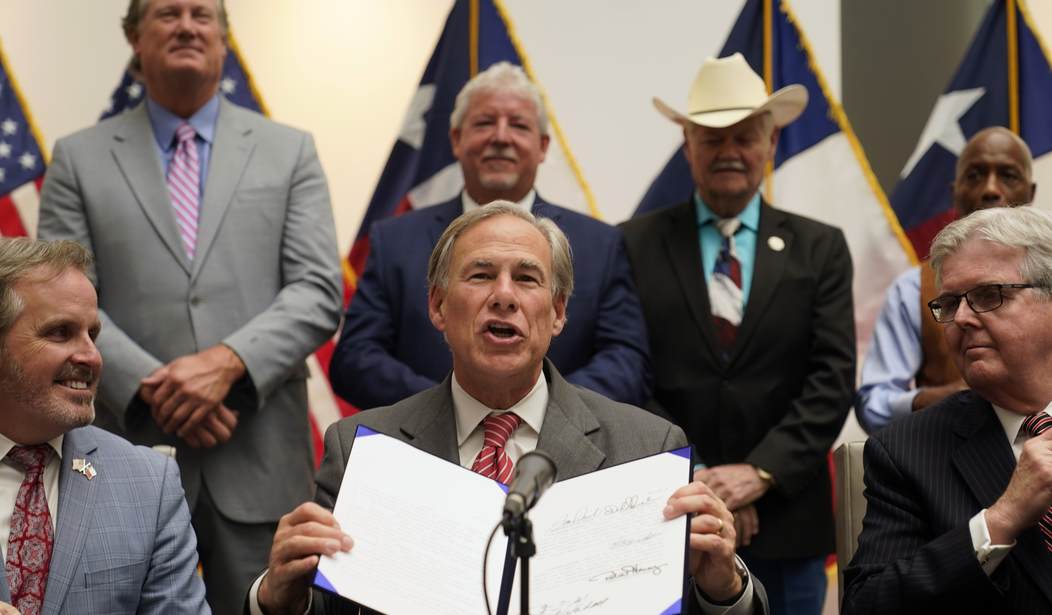This will be a politically tricky situation for Texas Governor Greg Abbott, to be sure. Abbott is known for doling out pardons to people during the Christmas season, frequently benefitting people who were convicted of relatively minor crimes from decades earlier. He is guided by the state’s parole board, where many of the members are people who were appointed by Abbott himself. But this year the board has dropped a hot potato on his desk. The board unanimously voted to suggest a posthumous pardon for George Floyd regarding a minor drug dealing conviction from more than 15 years ago. Given all of the unrest and rioting that’s taken place in Floyd’s name over the past couple of years, the optics of this are going to be interesting since Abbott is already facing a number of primary challengers from his own party for next year’s elections. (Associated Press)
Doling out pardons is a holiday tradition for Texas Gov. Greg Abbott, who around every Christmas grants them to a handful of ordinary citizens, typically for minor offenses committed years or decades ago.
But one name stands out on his desk: George Floyd.
Abbott has not said whether he will posthumously pardon Floyd this year for a 2004 drug arrest in Houston by a former officer whose police work is no longer trusted by prosecutors. Texas’ parole board — stacked with Abbott appointees — unanimously recommended a pardon for Floyd in October.
Texas doesn’t normally do posthumous pardons, but they are perfectly legal if Abbott wants to issue one. (There has only been one issued up until now.) And pardons can be issued whether the person in question was actually guilty or not. That second point is going to be particularly large in the decision that the Governor is facing.
The conviction in question involved a 2004 bust for selling $10 worth of crack in a police sting. The public defender from Houston who submitted Floyd’s pardon application is saying that “he didn’t do it,” so the pardon should be basically automatic. But can she say that for sure? The arrest in question involved a disgraced former police officer who was found to have lied to obtain a search warrant in 2019. That called many of his other arrests into question and Harris County District Attorney Kim Ogg has since dropped roughly 160 pending cases involving that officer.
But even if that cop was found to have been breaking the rules in 2019, does that automatically mean that he was cheating way back in 2004? The fact that Floyd pleaded guilty speaks against the idea of a phony bust, but it’s also true that many people who may believe they are innocent wind up pleading guilty and taking a lesser sentence if they are being threatened with a lot more time behind bars if they go to trial. Unless some new, concrete evidence has emerged from 17 years ago, it seems impossible to determine at this point whether Floyd was actually guilty of the drug bust or not.
Of course, even if Floyd was guilty, that doesn’t settle the matter. Being innocent should certainly put him in line for a pardon, but guilty people receive pardons also. And the unanimous recommendation of the parole board will likely put Abbott under even more pressure.
But the optics of this are awful for the Governor in terms of the upcoming primary race. George Floyd didn’t start all of the protests and riots that took place in his name because he was already dead when they happened. But his name was so closely associated with all of that violence that it’s impossible to separate the two. Abbott’s primary opponents will likely try to paint him as being “soft on crime” if he issues the pardon, even if the accusation is totally unfair. And given his reputation as a “law and order” governor, he’s probably going to be very sensitive to such a charge.
I don’t envy Greg Abbott this decision. No matter which way he goes, he’s going to generate a batch of headlines that he would doubtless prefer to avoid.









Join the conversation as a VIP Member